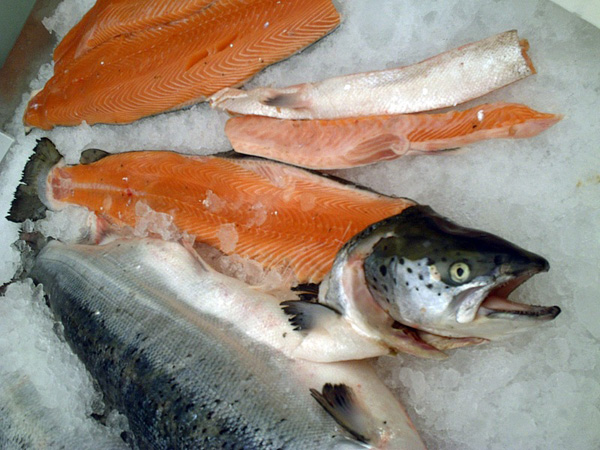A new study conducted by researchers at Stirling University in Scotland, suggests that on average, farmed salmon has about half the level of omega-3 fatty acids it had five years ago. While the news is worrying, the researchers say that farmed salmon is still one of the best sources of the essential nutrient.
“About five years ago, a portion of Atlantic salmon of 130g was able to deliver three-and-a-half grams of beneficial omega-3,” Professor Douglas Tocher, lead researcher on the study, told BBC News. “This is actually our weekly recommended intake.”
Omega-3 fatty acids are integral to a number of biological processes, including maintaining good heart health. The feed given to farmed salmon is being blamed as a potential reason for the decline.
“Now, the level of omega-3 has halved,” said Tocher. “Therefore, instead of eating one portion of farmed salmon, we would need to eat two portions of farmed salmon.”
While Tocher stressed that consumers should continue to buy farmed salmon in order to meet their recommended intake of Omega-3s, he expressed concern that the levels could continue to decrease if no action is taken. “If nothing was done, the level of the beneficial omega-3 can only really go down,” said Tocher.
Farmed salmon are fed a diet supplemented with smaller oily fish, which allow the salmon to build up their own levels of the fatty acid. While the salmon feed used to contain about 80 percent oily fish, it now only contains around 20 percent.
As the worldwide consumer demand for salmon has increased, the industry was forced to reduce the number of oily fish – namely, anchovies – in their feed, because of concerns around over-fishing. As a result, the supply of oily fish has continued to be spread even thinner amongst salmon producers.
“We have a fixed amount of fish oil, and we are making sure that we are using that as efficiently as possible,” said Dr. Paul Morris, of Marine Harvest, a worldwide producer of farmed salmon. “That won’t get us further than a certain amount of the way, so ultimately we will have to look at other sources of (beneficial) omega-3.”
According to Morris, the availability of oily fish in the past has allowed companies to search for a solution to the current shortage. The farmed salmon industry is currently looking to alternative sources of omega-3 supplements – including marine algae and (genetically modified) GM rapeseed plants – but the solution must be economical to work on a large scale.
“You could grow this crop on a thousand acres, or 10,000 acres or a million acres,” said Professor Jonathan Napier of Rothamsted Research in Harpenden, on the benefits of GM rapeseed for omega-3 production. “So, basically, the production of omega-3 fish oils is no longer limited by the amount of fish you can catch from the ocean.”
But the potential GM crop solution could face pushback from regulators in the EU, where GMOs are highly controversial. Even if they were introduced into the farmed salmon’s fish meal, consumers would still need to come to terms with buying meat produced using GMOs.
“It is going to be helped by what we can produce by agriculture,” maintains Napier. “We think this is a great potential solution to help fish farming become more sustainable and continue to grow as an industry.”












Join or login to leave a comment
JOIN LOGIN